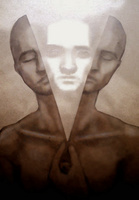The Soul’s Code
3 posters
Page 1 of 1
 The Soul’s Code
The Soul’s Code
Book Review: The Soul’s Code: In Search of Character and Calling by James Hillman
by Tom Butler-Bowdon on Oct 31, 2011 at 08:00
In a nutshell: Not only celebrities and nuns have ‘callings’. All of us have in our heart the image of the person we can be and the life we can live.
Is there a code to our souls, a DNA of destiny? The question compelled Hillman to trawl through the lives of actress Judy Garland, scientist Charles Darwin, industrialist Henry Ford, musicians Kurt Cobain and Tina Turner, and many others, searching for the ‘something’ that drove them on and made them live as they did.
His premise is that, just as the giant and majestic oak is embedded in the acorn, so does a person carry inside them an active kernel of truth, or an image, waiting to be lived.
The idea is not a new one: the Greeks had the word daimon to describe the invisible guiding force in our lives, the Romans the genius.
The idea of a soul image has a long history in most cultures, but contemporary psychology and psychiatry ignore it completely. Image, character, fate, genius, calling, daimon, soul, destiny – these are all big words, Hillman admits, and we have become afraid to use them, but this does not lessen their reality. Psychology can only seem to break down the puzzle of the individual into traits of personality, types, and complexes.
Who are our parents?
Hillman is brilliant at exposition of what he calls the ‘parental fallacy’, the belief that the way we are is because of how our parents were. Childhood, The Soul’s Code argues, is best understood in terms of the image with which we are born coming into contact with the environment in which we find ourselves. The child’s tantrums and strange obsessions should be seen in this context, rather than trying to ‘correct’ them in therapy.
In terms of our daimon, a parental union results from our necessity: the daimon selected the egg and the sperm as well as their carriers, called ‘parents’. This certainly turns the tables, but Hillman suggests that it explains the impossible marriages, quick conceptions, and sudden desertions that form the stories of so many of our parents.
He goes further to point out the poverty of seeing our mothers and fathers as, literally, mum and dad, when nature could be our mother, books our father - whatever connects us to the world and teaches us. Quoting Alfred North Whitehead, who said that ‘religion is world loyalty’, Hillman says that we must believe in the world’s ability to provide for us and lovingly reveal to us its mysteries.
The Soul’s Code shows how the daimon will assert itself in love, giving rise to obsessions and torments of romantic agony that defy the logic of evolutionary biology. Identical twins separated at birth are often later found to be wearing the same aftershave or smoking the same brand of cigarette, but in the most important choice of choosing a mate there can be great differences.
The bad seed
The Soul’s Code is engrossing when it comes to love’s opposite, the ‘bad seed’. Hillman devotes most of a chapter to the phenomenon of Adolf Hitler. Hitler’s habits, reported by reliable informants, give evidence of possession by a ‘bad’ daimon.
The principal difference to other lives discussed in the book is the combination of acorn and personality. Not only was Hitler’s acorn a bad seed, but it was wrapped in a personality that offered no doubts or resistance to it. From a single seed, we can see how the fascinating power in this man charmed millions into a collective demonic state.
This is not to suggest in any way that the terrible actions arising from a bad seed are justified. However, appreciating the criminal mind in terms of the daimon/acorn gives us a better understanding of it than our conventional idea of evil (that is, something to be eradicated or ‘loved away’).
The soul mystery
Having spent the book looking at the lives of the famous, Hillman raises the question of mediocrity—can there be a mediocre daimon? His answer is that there are no mediocre souls, a truth reflected in our sayings. We speak of someone having a beautiful soul, a wounded soul, a deep soul, or a child-like soul. We do not say that people have a ‘middle-class’, ‘average’, or ‘regular’ soul, he notes.
Hillman is not surprised that the people we call ‘stars’ often find life so difficult and painful. The self-image that the public gives them is an illusion and inevitably leads to tragic falls to earth.
The twists and turns of your life may not be as extreme as those of the celebrities, but they may have a greater positive effect. For character, Hillman says, we now look as much to ‘the soldier’s letter back home on the eve of battle, as the plans laid out in the general’s tent.’ One’s calling becomes a calling to honesty rather than to success, to caring and loving rather than to achieving. In this definition, life itself is the great work.
by Tom Butler-Bowdon on Oct 31, 2011 at 08:00
In a nutshell: Not only celebrities and nuns have ‘callings’. All of us have in our heart the image of the person we can be and the life we can live.
Is there a code to our souls, a DNA of destiny? The question compelled Hillman to trawl through the lives of actress Judy Garland, scientist Charles Darwin, industrialist Henry Ford, musicians Kurt Cobain and Tina Turner, and many others, searching for the ‘something’ that drove them on and made them live as they did.
His premise is that, just as the giant and majestic oak is embedded in the acorn, so does a person carry inside them an active kernel of truth, or an image, waiting to be lived.
The idea is not a new one: the Greeks had the word daimon to describe the invisible guiding force in our lives, the Romans the genius.
The idea of a soul image has a long history in most cultures, but contemporary psychology and psychiatry ignore it completely. Image, character, fate, genius, calling, daimon, soul, destiny – these are all big words, Hillman admits, and we have become afraid to use them, but this does not lessen their reality. Psychology can only seem to break down the puzzle of the individual into traits of personality, types, and complexes.
Who are our parents?
Hillman is brilliant at exposition of what he calls the ‘parental fallacy’, the belief that the way we are is because of how our parents were. Childhood, The Soul’s Code argues, is best understood in terms of the image with which we are born coming into contact with the environment in which we find ourselves. The child’s tantrums and strange obsessions should be seen in this context, rather than trying to ‘correct’ them in therapy.
In terms of our daimon, a parental union results from our necessity: the daimon selected the egg and the sperm as well as their carriers, called ‘parents’. This certainly turns the tables, but Hillman suggests that it explains the impossible marriages, quick conceptions, and sudden desertions that form the stories of so many of our parents.
He goes further to point out the poverty of seeing our mothers and fathers as, literally, mum and dad, when nature could be our mother, books our father - whatever connects us to the world and teaches us. Quoting Alfred North Whitehead, who said that ‘religion is world loyalty’, Hillman says that we must believe in the world’s ability to provide for us and lovingly reveal to us its mysteries.
The Soul’s Code shows how the daimon will assert itself in love, giving rise to obsessions and torments of romantic agony that defy the logic of evolutionary biology. Identical twins separated at birth are often later found to be wearing the same aftershave or smoking the same brand of cigarette, but in the most important choice of choosing a mate there can be great differences.
The bad seed
The Soul’s Code is engrossing when it comes to love’s opposite, the ‘bad seed’. Hillman devotes most of a chapter to the phenomenon of Adolf Hitler. Hitler’s habits, reported by reliable informants, give evidence of possession by a ‘bad’ daimon.
The principal difference to other lives discussed in the book is the combination of acorn and personality. Not only was Hitler’s acorn a bad seed, but it was wrapped in a personality that offered no doubts or resistance to it. From a single seed, we can see how the fascinating power in this man charmed millions into a collective demonic state.
This is not to suggest in any way that the terrible actions arising from a bad seed are justified. However, appreciating the criminal mind in terms of the daimon/acorn gives us a better understanding of it than our conventional idea of evil (that is, something to be eradicated or ‘loved away’).
The soul mystery
Having spent the book looking at the lives of the famous, Hillman raises the question of mediocrity—can there be a mediocre daimon? His answer is that there are no mediocre souls, a truth reflected in our sayings. We speak of someone having a beautiful soul, a wounded soul, a deep soul, or a child-like soul. We do not say that people have a ‘middle-class’, ‘average’, or ‘regular’ soul, he notes.
Hillman is not surprised that the people we call ‘stars’ often find life so difficult and painful. The self-image that the public gives them is an illusion and inevitably leads to tragic falls to earth.
The twists and turns of your life may not be as extreme as those of the celebrities, but they may have a greater positive effect. For character, Hillman says, we now look as much to ‘the soldier’s letter back home on the eve of battle, as the plans laid out in the general’s tent.’ One’s calling becomes a calling to honesty rather than to success, to caring and loving rather than to achieving. In this definition, life itself is the great work.

skfarblum
 Re: The Soul’s Code
Re: The Soul’s Code
Excellent review skfarblum thanks for sharing this with us.
The idea of the seed, kernel - acorn is certainly an intriguing one, giving food for thought. You'll have me pondering on this throughout the day now ...
The idea of the seed, kernel - acorn is certainly an intriguing one, giving food for thought. You'll have me pondering on this throughout the day now ...

_Leslie_
 Re: The Soul’s Code
Re: The Soul’s Code
Fascinating,Stephen.
Made me think of my own life.
A code to our souls?
You may well be right there. Genes from our parents give us resemblances in facial features,colour of hair,eyes and so on even our personal characteristics.
But the soul,that is an interesting fact for debate.
What do we inherit from our parents from the soul if anything?
Destiny as you implied or is the soul just a part of us that is purely personal.
Holding our destiny,our hopes and wishes or does it direct our lives in a way that is unique only to us.
Joan
Made me think of my own life.
A code to our souls?
You may well be right there. Genes from our parents give us resemblances in facial features,colour of hair,eyes and so on even our personal characteristics.
But the soul,that is an interesting fact for debate.
What do we inherit from our parents from the soul if anything?
Destiny as you implied or is the soul just a part of us that is purely personal.
Holding our destiny,our hopes and wishes or does it direct our lives in a way that is unique only to us.
Joan

petal34
 Re: The Soul’s Code
Re: The Soul’s Code
The basic idea of James Hillman is very briefly as follows.
The soul of each of us is given a unique daimon before we are born,and it
has selected an image or pattern that we live on earth.This soul-companion,the
daimon,guides us here;in the process of arrival,however,we forget all
that took place and believe we come empty into this world.The daimon remembers
what is in your image and belongs to your pattern,and therefore your
daimon is the carrier of your destiny.
He emphasizes that this is a myth,that dates from the time of Plotinus.
By preserving this myth we may better preserve ourselves and prosper.
In other words,the myth has a redemptive psychological function,and
a psychology derived from it can inspire a life founded on it
Stephen
The soul of each of us is given a unique daimon before we are born,and it
has selected an image or pattern that we live on earth.This soul-companion,the
daimon,guides us here;in the process of arrival,however,we forget all
that took place and believe we come empty into this world.The daimon remembers
what is in your image and belongs to your pattern,and therefore your
daimon is the carrier of your destiny.
He emphasizes that this is a myth,that dates from the time of Plotinus.
By preserving this myth we may better preserve ourselves and prosper.
In other words,the myth has a redemptive psychological function,and
a psychology derived from it can inspire a life founded on it
Stephen

skfarblum
 Similar topics
Similar topics» eternal-soul-past-life-regression.
» Is the Soul Within Us?
» What is the soul, the Atman
» The soul and the spirit
» My Spirit Guide/ my twin soul........
» Is the Soul Within Us?
» What is the soul, the Atman
» The soul and the spirit
» My Spirit Guide/ my twin soul........
Page 1 of 1
Permissions in this forum:
You cannot reply to topics in this forum